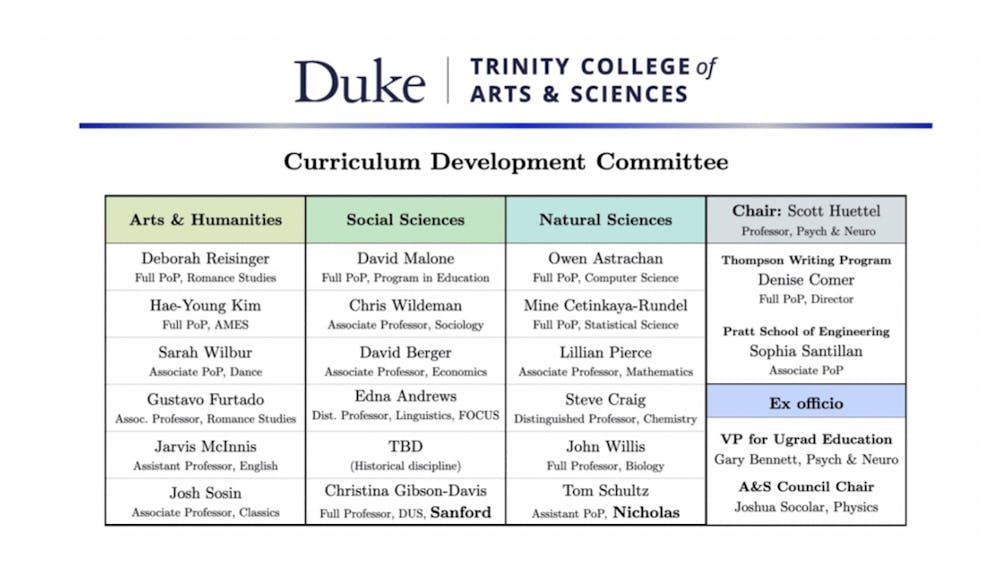The Arts & Sciences Council introduced the committee that will revamp the Trinity College of Arts & Sciences curriculum and approved a new minor at their Thursday meeting.
At the beginning of the meeting, the Council approved the Asian American and Diaspora Studies Minor with an overwhelming majority. Student groups have been advocating for the creation of an Ethnic Studies department; the Asian American Studies Working Group was founded in 2016 and was instrumental in the development of the Asian American and Diaspora Studies program that launched in 2018.
The Council then presented the Curriculum Development Committee, designed to upgrade the Trinity College of Arts & Sciences curriculum.
“Over the past months, our Council and the faculty at large have begun to think in earnest about our vision for a curriculum that speaks to the needs of the next several generations of students, and about the process that will lead us to a result we can enthusiastically embrace,” said Professor of Physics Joshua Socolar, who serves as the Council’s chair.
The Curriculum Development Committee is split into three divisions: Arts and Humanities; Social Sciences; and Natural Sciences. Members in these divisions are faculty from Trinity, Nicholas School of the Environment and Sanford School of Public Policy. The committee also includes representatives from the Thompson Writing Program and the Pratt School of Engineering.
Last week, 17 Council members split into groups to discuss ideas for the Committee to consider in their work. One common theme that emerged among council members was that students should be exposed to a variety of disciplines throughout their undergraduate education.
“We had general agreement [in our group] around the fact that we want to engage students early on with diverse intellectual ideas, and spent time discussing how best to do this,” said Thomas Schultz, assistant professor of the practice of marine molecular conservation.
Christina Williams, professor of psychology and neuroscience, added that her group agreed with this sentiment.
“We want to make sure that the new curriculum exposes students to a range of disciplines and disciplinary perspectives that will allow them to become global citizens, culturally well rounded, historically conscious, good problem solvers with an appreciation of history, social sciences, humanities, the arts and an understanding of science and the scientific method,” Williams said.
Williams also emphasized that her group hoped that the new curriculum would steer students away from a “pre-professional college education.”
Groups also debated the extent to which the curriculum needs to be changed from the current Curriculum 2000 and urged the Committee to do the same.
Professor of Classical Studies Micaela Janan brought up an example of requiring a research experience for all students, which “might be nice in theory” but could also be “onerous and counterproductive in practice.”
Williams’ group echoed this thought as well, saying that Curriculum 2000 already addresses some of the goals that the Council hopes to incorporate into the new curriculum.
Ruth Day, associate professor of psychology and neuroscience, added that Curriculum 2000 incorporated the right ideas in its vision, but failed on the implementation.
As an example, she cited the distribution requirement structure of Curriculum 2000, which was meant to introduce students to a variety of fields of study. Day said that this system devolved into “students just checking off boxes.”
“I know generally what we do is we get the content and structure right first, and then somebody else implements,” Day said. “And so I would like to urge the committee to think about the implementation, along with the content and structure in the original discussion.”
Council members also discussed breadth versus depth of exploration in a curriculum.
“Students who want to deeply engage in disciplinary studies should be encouraged to pursue their passions with deep dives into advanced courses in a discipline while we also encourage students to take risks and explore widely,” Janan said.
When the floor was opened to comments for the Committee from the audience, Christine Folch, assistant professor of cultural anthropology, added that too much student autonomy within the curriculum could lead to too much breadth and not enough depth. When a curriculum emphasizes student autonomy, “the core basics of disciplines” get left behind, according to Folch.
Folch mentioned that when she asked a Program II student, “What kind of research techniques are you interested in using to explore your fascinating topic?” the student, a junior, struggled to answer because they “had not taken any social science research methods classes.”
“The [101 level classes], sometimes they seem less sexy, they get left to the wayside, and I don't know how to balance that out,” she said.
Get The Chronicle straight to your inbox
Signup for our weekly newsletter. Cancel at any time.

Adway S. Wadekar is a Trinity junior and former news editor of The Chronicle's 119th volume.

